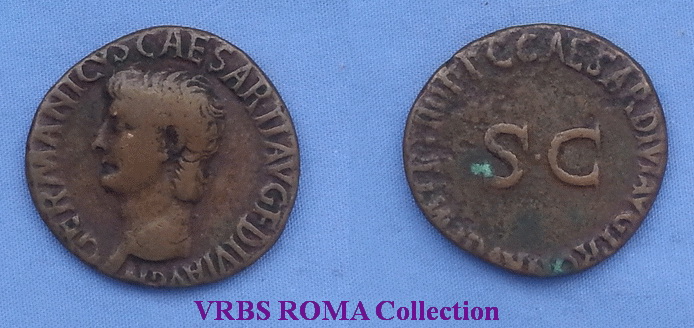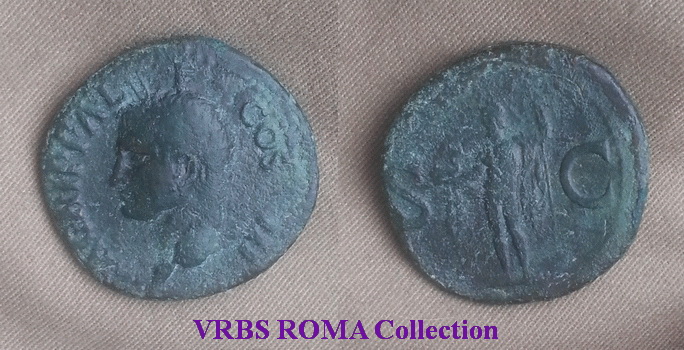|
|
|
Caligula And His Coins
Caligula, born Gaius Julius Caesar Augustus Germanicus (31 August AD 12
– 24 January AD 41) was Roman emperor from AD 37–41. Caligula
(meaning 'little soldier's boot', or 'little boots') was born to the most
powerful house in Rome: The Julio-Claudian dynasty. Young Gaius was
nicknamed "Caligula" by his father's soldiers while accompanying him during
his campaigns in Germania. Caligula's biological father was Germanicus
(The brother of Claudius I); he was the great-nephew and adopted son of
Emperor Tiberius.
Caligula's father and Claudius' brother Germanicus died at Antioch in AD
19. His wife Agrippina the Elder returned with Caligula and his five
siblings to Rome, where she engaged in a life and death feud with Tiberius;
the ruler of the Roman Empire. Her conflict with Tiberius was an
extreme example of cultural naivety most likely the result of being an
aristocrat that was married, and the co-parent of the extremely popular
Germanicus. Her battle with the supreme leader of the most powerful
empire on Earth, save, possibly, that of China, lead to the death of every
member of her family; every member but for Caligula.
Caligula was isolated from these deadly machinations due to his extremely
hedonistic life style. Hedonism was something he had in common with
Tiberius. Tiberius offered him an invitation to join him in AD 31
on the island of Capri; where Tiberius had been sequestered for five years.
This was during the time that Sejanus was making his move to isolate Tiberius,
and sieze control of the Empire.
With the death of Tiberius in AD 37, Caligula succeeded his grand uncle
and adoptive grandfather as emperor.
There are few surviving sources about the reign of Emperor Caligula.
Critical thought would lead historians to view the description of Calugula
as a noble and moderate ruler during the firstseveral months of his reign
as the result of it being safe to do so. As time passed, descriptions
and comments on Caligula and his conduct centered on his more extreme conduct,
and how they threatened the survival of those who had a great deal to loose.
I doubt if the common citizens in the street were very concerned that they
would be loosing the little they had.
While the reliability of historical sources is questionable, it is known
that Caligula spent a great deal of resources securing the personal power
of the emperor. However, he did construct, incontrast to his luxurious
dwellings, two aqueducts: the Anio Novus and the Aqua Claudia.
He expanded the empire when he annexed the Kingdom of Mauretania, and making
it a province of Rome.
In early AD 41, Caligula was assassinated as a result of a conspiracy by
officers of the Praetorian Guard, senators, and courtiers. The conspirators'
used the opportunity to restore the Roman Republic, but were uterly unsuccessful.
A very comical part of the BBC series was the moment that the players in
the military, and, more importantly, the Praetorian Guard realized that
they needed an emperor to secure their jobs; they declared Caligula's uncle,
Claudius, the next Roman emperor.
Whether Caligula was a crazy emperor who damaged the empire by setting
standards for extremes and indulgences rather than rule and reason is easily
ignored with even a superficial reading of the history to follow.
He did not. The ascent of the crazy ruler existed before his reign,
and has continued to the present day. It is unlikely to change.
Brace yourself.
The Claudio-Julian family supplied Rome with two more emperors; one crazy,
the other not so much.
Coins minted under the reign of Caligula:
Like all emperors, kings, prime ministers, presidents, and dictators, Caligula
minted coins that were designed to increase his importance, status, and
power. He did this by connected himself to his ancestors, religious groups,
gods and goddesses, and the most significant people in Roman history.
Below is a coin honoring Caligula's relation to his father Germanicus.

(26/28mm 8.76grms)
Germanicus Æ As.
Obv: GERMANICVS CAESAR TI AVG F DIVI AVG N, bare head
left
Rev: C CAESAR DIVI AVG PRON AVG P M TR P IIII P P
around large SC
BMC. 74 Cohen 4
Struck 39-40 AD.
Another example of Caligula's effort to absorb status by drawing a relationship,
or better a connection to Agrippa (Marcus Vipsanius Agrippa) who was not
an aristocrat or patrician, but was a hero in the minds of Romans. Agrippa
was the close friend of Augustus, and his general during their victory
over Mark Antony at the Battle of Actium September 2, 31 BC.
|
|
Articles
By: Anthony Ballatore
Roman Emperors & their Coins
0)
Ancient Roman Coins On Ebay
1)
When, where & why were coins first made?
2)
The Story of Romulus and Remus & The Birth of Rome
3)
The Roman Republic
4)
Julius Caesar and the Death of the Republic
5)
Augustus Caesar: The First Roman Emperor
6)
Tiberius Caesar: The First Julio-Claudian Heir
7)
Caligula: The first really crazy Caesar
8) Claudius: A level headed Caesar?
9) Nero: The Last Julio-Claudian Heir
|
|
Websites worth knowing:
WildWinds.com
By far the single best location for identifying, evaluating, and touring
ancient coins. This link will direct you to their seach engines. Enjoy.
ForumAncientCoins.com
Along with WildWinds, this is a site of the highest regard, accurate
information, and ethical policies; 'AUTHENTICITY GUARANTEED FOR ETERNITY'
says it all.
FSRCoins.com
Frank S. Robinson is a unique individual. I have more respect for Mr.
Robinson than any other coin dealer. His book 'The Case for Rational
Optimism' (2009) will most likely leave you with this same perspective.
If his book doesn't, dealing with him will. He is often mistaken for Neil
Armstrong. :-)
Harlan
J. Berk, Ltd.
Located in Chicago, Harlan J. Berk, Ltd. is an excellent location for
both common and rare coins; often of
museum quality.
Rg.ancients.info
Reid Goldsborough's web pages are well written, educational, the first
site to read regarding counterfiet coins. This site is hosted for free
by VCoins.
VCoins.com
A commercial coin and information site established December 3, 1998.
Their code of ethics and years of operation speaks loudly.
DirtyOldCoins.com
Another commercial coin and information site.
ThePenAndQuill.com
One of our sites dedicated to pens, ink, quills, books, writing, reading,
history, and anything else that envolves language, art, and ideas.
|

(27/27mm 10.07grms)
Agrippa, Æ As.
Struck under Caligula, 37-41 AD
Obverse: M AGRIPPA L F COS III, head left wearing
rostral crown
Reverse: S-C, Neptune standing facing, head left,
naked except for cloak draped behind him & over both arms, holding
small dolphin in right hand & vertical trident in left
RIC 58 [Caligula], Cohen 3, BMC 161
Mark Antony was a pariah in the minds of most Romans. He was a traitor
to Roman values and virtues.
Caligula was born the same year that Agrippa died; 12 AD. This probably
didn't play in his effort to associate himself with Agrippa, however, Agrippa's
winning the Battle of Actium and forcing Antony and Cleopatra to rush back
to Egypt was a message the coin below suggests strongly. The Battle
of Actium was a naval battle, and Neptune is featured on this coin.
Associating himself with Octavian and Aggripa, and separating himself from
Antony was much more significant than the mere winning of a battle.
By associating himself with Aggripa, and thereby adding glue to his bond
with his ancestor Augustus, Caligula make a statement of piety.
Piety was arguably the most important virtue and value in the Roman Empire.
To be pius was to be a model Roman man or woman. When Mark Antony married
Cleopatra in 36 BC, but didn't divorce Octavia until 32 BC, he was seen
to have rejected Roman tradition, law, and respect for piety, and at the
same time slap Octavian upside the face. Piety meant duty, religiosity,
loyalty, devotion, and charity. Antony was seen to have adopted the gods
and goddesses of Egypt.
Whether he actually appointed the horse Incatatus to the senate, believed
himself to be a god, had sex with his sister, or were merely the writings
of people who dipped pen to ink when it was safe, and wonderful to do so,
it is clear that Caligula was unique, interesting from our perspective,
and the brick and mortor of may fine books and movies. |
|
|